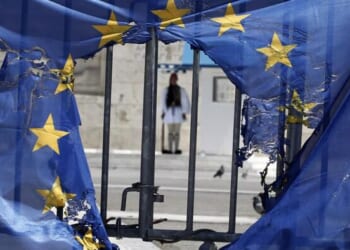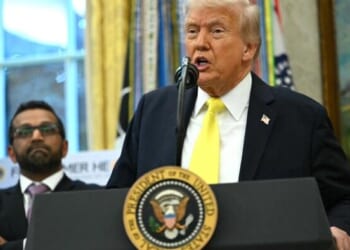Authored by Bruce Oliver Newsome via American Greatness,
Last week, Britain’s official inquiry into the government’s handling of COVID released its second report.
Despite spending £192 million, interviewing 166 witnesses, and publishing more than 1,000 pages already, the most expensive public inquiry in British history (£160,000 per day) cherry-picks four persons to blame, blames these four persons for a “toxic and chaotic culture,” and cherry-picks evidence in support of earlier preventive measures and lockdown.
Note 1 to Britain’s elite: Four people don’t make a “culture” in a government of more than half a million full-time servants and politicians!
Note 2 to Britain’s elite: Groups have processes and structures too, not just cultures.
Procedurally, why was the government making decisions about lockdown without a cost-benefit analysis, even in the Treasury, according to the then Chancellor (Rishi Sunak)?
The report quotes Dominic Cummings making the same complaint, but leaves it hanging.
Structurally, should the Scientific Advisory Group for Emergencies have led policy-making, gone public with information in opposition to the administration it advised, and even briefed against ministers who don’t “follow the science?”
The inquiry doesn’t ask these questions.
The report betrays an annoying ignorance of risk management. It uses the word “could” 151 times, “might” 70 times, and “possibly” or “possible” 69 times. These are the words that lawyers and politicians love (for their open-endedness). These are the same words that consumers of risk estimates hate (for their open-endedness). An asteroid “could” and “might” destroy the earth. Now what?
The word “unlikely” is used just twice. The word “likely” is used 79 times, but, as we shall see, some of the report’s estimates of “likely” are based on already-discredited models.
The COVID inquiry is typical of British official inquiries.
For decades, British official inquiries into healthcare have identified a “toxic culture,” associated this culture with a few scapegoats or political enemies, and ignored structure and process.
-
In 2013, Julie Mellor, then the Parliamentary Health Service Ombudsman (PHSO), criticized the NHS for a “toxic cocktail” of a “culture of defensiveness” and “a failure to listen to feedback.”
-
Later that year, a clinical professor completed an inquiry into safety within the wider NHS, which recommends a “zero harm” culture, a legal duty for all healthcare workers to admit their mistakes, and “minimum staffing levels.”
-
In 2014, Health Secretary Jeremy Hunt promised an “open culture that learns from errors and corrects them,” following the example of the airline industry (a false analogy, incidentally).
-
In 2015, Parliament’s Public Administration Select Committee (PASC) “commend[ed] the Secretary of State’s determination to tackle the culture of blame and defensiveness.”
Criticizing “culture” is a way of avoiding accountability for the people and institutions you like. Culture is an attribute of a group, so it is no one person’s fault, except anyone you want to scapegoat.
The people who run official inquiries are politicians, lawyers, and public servants who know nothing of organizational design but know a lot about smearing political enemies. Moreover, while they cherry-pick a few to throw under the bus, they avoid the unfitness of the wider elite they represent.
Baroness Heather Hallett’s inquiry into Britain’s handling of COVID falls into the same pattern. She’s a lawyer and a politician. She never called any witnesses who could have educated her in organizational design or political science.
Nevertheless, she brought all sorts of bad assumptions, myths, and habits of thinking about organizations and politics. Hallett’s assumptions, myths, and habits are typical of the progressive-socialist consensus.
Hallett’s report blames a “toxic and chaotic culture” on four people: the Prime Minister Boris Johnson, his special adviser Dominic Cummings, the Health Secretary Matt Hancock, and the Permanent Secretary for Health—now Keir Starmer’s Cabinet Secretary—Sir Chris Wormald.
The inquiry criticizes Wormald for a “failure to rein in” Hancock’s tendency to over-promise, which suggests that Hallett wishes that unelected government servants were as bold as Aristotle’s unelected philosopher-kings.
Hallett wishes Wormald had been bold enough to drive earlier restrictions on British freedoms.
Outside of Britain’s government, the inquiry criticizes Nicola Sturgeon for over-promising, in June 2020, that Scotland could drive COVID “as far as we can towards total elimination” (despite an open border with England).
Yet beyond these convenient scapegoats, the inquiry doesn’t help us avoid similar missteps in the future—apart from:
-
Don’t employ Johnson, Cummings, Hancock, Wormald, or Sturgeon.
-
Don’t allow a “toxic and chaotic culture.”
-
Impose restrictions earlier, even though the restrictions didn’t work.
The report “rejects the criticism” of the imposition of lockdown in 2020. Moreover, the report criticizes the government’s decision against lockdown in 2021 (when the Omicron variant appeared), because “the UK government’s approach in this period was, once again, overly optimistic.”
Yet the same report hypocritically claims not to be advocating for lockdowns and to be mindful of the economic losses, social costs, missed education, and loss of liberties.
Hallett criticizes the government’s failure to predict all the losses and costs but also claims that lockdowns could have been “avoided entirely” had “stringent restrictions” been imposed earlier than 16 March 2020.
The inquiry ignores the possibility that voluntary behavioral adjustment would have produced the same outcomes in Britain. Google mobility data shows that Britons had reduced movement before the lockdown was announced.
Instead, the report claims that earlier contact tracing, self-isolation, face coverings, and respiratory hygiene could have stopped the need for a lockdown if introduced earlier.
The report does not admit that
-
The contact tracing app took too long to develop and never worked properly.
-
Home tests of infection were unreliable.
-
Compliance with self-isolation tended to extremes of either partying in Number 10 or deadly loneliness.
-
Cloth masks didn’t work as promised.
-
Respiratory hygiene is a moral hazard (you might cover your cough, but plenty of people sitting next to you do not).
Moreover, Hallett does not admit any issue linkage or ulterior motive behind these restrictions. Lord Frost (then Johnson’s chief adviser on Europe) writes that “a turning point for me was being in a meeting in mid-2020 in which we were told that masks had no meaningful effect but should be required anyway ‘to remind everyone we were in a pandemic.’”
Hallett claims that once these “stringent restrictions” failed, lockdown was inevitable.
Moreover, Hallett claims that 23,000 lives could have been saved if lockdown had been imposed a week earlier—a conclusion derived solely from a model that had always overestimated casualties.
Hallett dismisses Sweden’s choice against lockdown, as if Sweden’s choice was for freedom over safety. Hallett never called to witness the academics who had already found that Sweden experienced fewer deaths and lower costs per capita, even adjusting for demographics.
The Telegraph reported Hallett’s product as a £200 million “I told you so.” Oliver Johnson, a mathematician, tweeted: “I see that if you give lawyers £200m and ask them to focus solely on the first wave, they decide we should have made the first wave as small as possible.”
The problem with British governance is that we are ruled by unaccountable non-experts. These same people are both unqualified and disincentivized to reveal the unaccountability and non-expertise within the class they inhabit.
Loading recommendations…

















